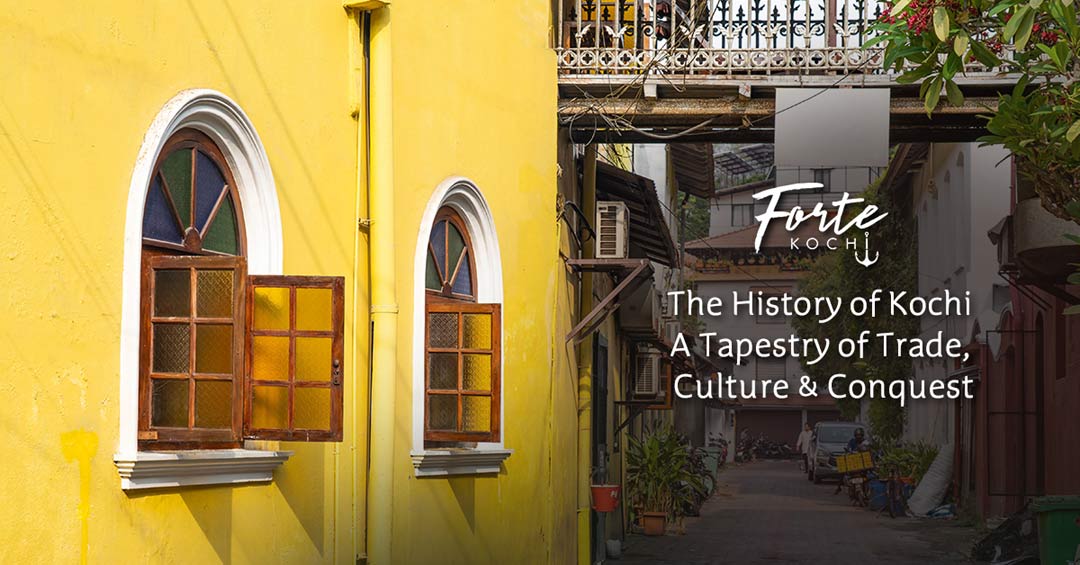Scroll down for more


Kochi, earlier known as Cochin, is a port city tucked away by sailing history, cultural exchange, and colonial influence for centuries. On the east is the strategic position of the Western Ghats, while towards the west lies the Arabian Sea- a combination that has lured travelers, traders, and conquerors for ages. In due course, it grew into an important spice- trading center that drew all kinds of people, cultures, and influences which have molded this city into what it is today.
Kochi has been a major port city. In fact, its mention finds a place in historical records left behind by one Chinese traveler named Ma Huan who visited this region in the early 15th century. Its rise as a port city began with the fall of the Kulashekhara kingdom, which resulted in the total fragmentation of power in Kochi. It was this fragmentation that allowed Kochi to come up as a major trading hub, with merchants from across the world coming down to these shores: Arabs, Chinese, Portuguese, Dutch, and British, each of whom has left a stamp on the culture, architecture, and lifestyle of the city.
The history of Kochi is inseparable from the history of its royalty, which played a very vital role in the development of this place. The Kochi Rajas were very much entangled with their relations with foreign powers, though they played a very vital role in shaping the destiny of the region.
One of the striking rulers was Sakthan Thampuran, or Rama Varma V, who ruled from 1790 to 1805. Sakthan Thampuran was an able administrator and diplomat who introduced major reforms that turned this city into a modern one and strengthened its economy. He played an instrumental role in maintaining checks and balances against feudal lords, thereby consolidating power for the general prosperity of Kochi.
The last ruler was Parikshith Thampuran, who had a very short rule till the merger of Cochin with the state of Travancore in 1949, thereby ending the era of princely states.
Fort Emmanuel, also known as Fort Manuel is a sheer epitome of Portuguese influence in Kochi. The construction work from this fort had been started in 1503, while reinforcements came in 1538. It is named after King Emmanuel I of Portugal. The fort had been built after there was a strategic alliance reached upon between the Maharajah of Kochi and the royal family of Portugal.
It was a large fort, housing an entire township within its walls, thus affording perimeter protection to the Portuguese settlement. However, the fortunes of the fort changed with the arrival of the Dutch in the year 1663, who captured Kochi and dismantled much of this Portuguese infrastructure. The fort subsequently fell into British hands in 1795, and by 1806, most of its walls and bastions lay in ruins. A few remnants of Fort Emmanuel, its gun battery, and fortifications, which have been partially restored to date, still attract tourists to Fort Kochi.
Vasco House is arguably the most iconic landmark of Kochi, believed to be the residence of the legendary Portuguese explorer Vasco da Gama. Dating back to the beginning of the 16th century, the Vasco House is among the oldest European-style houses in India, with typical balcony verandas and glass-paneled windows reflecting the architectural fashion of those times.
Vasco da Gama, who came to Kochi first in 1498, played a very significant role in the establishment of Portuguese supremacy. He had to come a number of times to India, and his house in Fort Kochi became representative of two old friends-Portugal and Kochi. Known now as Vasco House, it reminds one of the rich history of the city and the enduring legacy of its European connections.
Adding a modern touch to Kochi's historical landscape is the Forte Kochi Hotel, a luxurious boutique hotel located in the heart of Fort Kochi. This heritage boutique hotel is situated in one of the most picturesque colonial-era buildings of Kochi, dating back to the time of the Portuguese and the Dutch. The architecture is eclectic and essentially European, with a hint of the Jewish and Indian influences of the city.
The stay at Forte Kochi reminds one of times past with their antique furniture, period décor, and old-world charm. That is one distinctive invitation to the celebrated heritage of Kochi. Guests can treat themselves to all the modern luxuries here, helping to bridge a magnificent, rich-in-history past and a vibrant present that is Kochi. Historical and luxury travelers alike shouldn't miss this spot.
History has trodden Kochi with a blend of diverse cultural influences-an extensive consequence of interaction with foreign powers. Besides the regular local and regional influences, by the time they reached Kochi, the Portuguese were the first Europeans to set up a stronghold; more followed-the Dutch and the British. Each one of them left their stamp on architecture, language, and customs.
The Portuguese influence is much in evidence, with Malayalam having borrowed into it a number of loanwords. An example is the word for "key," chaavi, which is from Portuguese chave. Then there is annara for pineapple, derived from Portuguese ananas, and alumaari, meaning wardrobe, which has been borrowed from armario. These are some linguistic traces of the deep exchange of culture between the Portuguese and the people of Kochi.
The history of Kochi is an intriguing tale of trading, conquests, and cultural fusion. From the rule of the Kochi Rajas to the building of Fort Emmanuel and Vasco House, the city has been molded by many influences that can never be erased from its identity. Today, Kochi stands as one of the most vibrant metros in the country, which still celebrates its rich heritage while welcoming the future. A gateway to the world, the story of Kochi is one of survival, adjustment, and standing charm, along with being a place that no one interested in unraveling the rich tapestry of the past of India would like to miss.